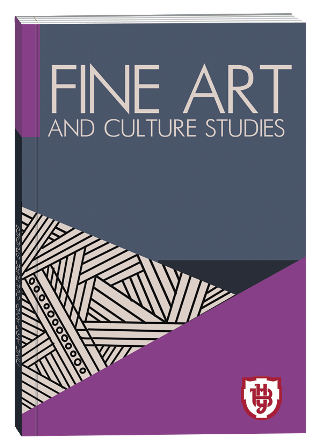ACTUALISATION OF THE IDIOGRAPHIC APPROACH IN CULTURAL STUDIES
DOI:
https://doi.org/10.32782/facs-2024-1-30Keywords:
culture, methodology of cultural studies, method, idiographic approach.Abstract
This article is the first attempt at a scientific reflection on the possibility of using the idiographic approach in cultural studies. The relevance of the stated problem is related to the formation of the methodology of cultural studies, which is open to the search for optimal and alternative research tools. The purpose of the study is an attempt to actualize the idiographic approach in the methodology of cultural studies. The paper substantiates the correctness of using the term «idiographic approach», as opposed to the «idiographic method», which is often used in scientific works, due to the distinction between them in terms of content and methodological meaning. The author clarifies the situation of spelling inconsistencies and different spellings of the name of the approach, and argues for the expediency of using the term «idiographic». The article analyses the peculiarities of the application of the idiographic approach in philosophy, historical sciences, sociology, theatre studies, and management theory. The author investigates how the idiographic approach relates to the biographical, hermeneutical and nomothetic approaches. It is noted that, unlike the idiographic approach, which describes the individual, unique, the nomothetic approach is aimed at identifying patterns and tends to describe the general. These approaches are interrelated and should be used simultaneously in cultural studies as a method of understanding and explanation. It is established that the idiographic approach is related to hermeneutics as a general theory of interpretation. The use of the idiographic method of cognition is usually based on hermeneutical procedures of understanding. The idiographic approach is focused on a deep understanding of cultural phenomena through the analysis of specific contexts. The biographical approach is close to the idiographic approach. The idiographic approach focuses on specific cultural phenomena and events. The idiographic approach focuses on specific individuals and their contribution to culture. It is noted that these two approaches in cultural studies can complement each other. The article considers «qualitative» and «quantitative» methods as research tools of cultural studies. It has been established that the idiographic approach is focused on using qualitative methods, but it is important for cultural studies to use two arsenals of knowledge – «qualitative» and «quantitative». It is concluded that the idiographic approach focuses on the unique nature of each phenomenon and process; it is focused on understanding individual and unique aspects of specific cultural phenomena and phenomena, which allows avoiding generalizations. We believe that the actualization of the idiographic approach is promising, and its further development can strengthen and complement the methodological tools of cultural studies.
References
Альохін Е.В. Теорія цінностей В. Віндельбанда і Г. Ріккерта та її значення в історії соціологічної науки. 2008. Режим доступу: http://elbib.in.ua/teoriya-tsinnostey-v-vindelbanda-i-g-rikkerta-i-yiyi-znachennya-v-istoriyisotsiologichnoyi.html
Антонюк О. В. Методологічні засади культурології як науки: проблеми становлення та розвитку. Часопис Національної музичної академії України імені П. І. Чайковського: наук. журн. Київ. 2008. № 1. С. 17–28.
Герчанівська П. Е. Модель культурологічного дослідження в парадигмі теорії систем. Українські культурологічні студії. 2017. № 1 (1). С. 19–22.
Дабло Л.Г., Кислюк К.В., Кравченко О.В., Петрова І.В., Сабадаш Ю.С., Янковський С. В. та ін. Сучасна культурологія: постмодернізм у логіці розвитку української гуманістики : кол. Монографія. Київ : Видавництво Ліра-К. 2021. 432 с.
Кислюк К. В. Метод соціокультурної каузальності в процесах розбудови культурології як науки. 2019. Режим доступу: file:///C:/Users/Lenovo-PC/Downloads/13233-Article%20Text-30382-1-10-20200202-1.pdf
Клековкін О. Ю. Мистецтво: Методологія дослідження: методичний посібник Інституту проблем сучасного мистецтва Національної академії мистецтв України. К.: Фенікс. 2017. 144 с.
Ковалевський С., Медведєва О., Хаєт Г. Методи вивчення та структура культури організації. 2008. Режим доступу: https://osvita.ua/school/method/1762/
Ковалів Ю.І. Ідіографічний метод. Літературознавча енциклопедія: у 2 т. Київ: ВЦ «Академія». 2007. Т. 1: А – Л. 609 с.
Коржова А. Особливості методології дослідження історії театру у працях Петра Руліна // Сучасні дослідження в галузі культури і мистецтв : збірник матеріалів Міжнародної науково-практичної конференції, 26.04.2018 р. Київ : КНУТКТ імені І. К. Карпенка-Карого. 112 с.
Лагодієнко В.В., Каламан О.Б., Пурцхванідзе О.В. Особливості методології наукового дослідження сфери управління. Бізнес-навігатор, № 5. С. 77–83. 2020. Режим доступу: http://www.business-navigator.ks.ua/journals/2020/61_2020/14.pdf.
Ламієл Дж. Т. Номотетичний та ідеографічний підходи до вивчення особистості. 1981. Режим доступу: http://psiholageosob.blogspot.com/2014/11/blog-post_43.html
Макеєв С.О. Соціологія: навч. Посібник. К.: «Українська енциклопедія» ім. М. П. Бажана. 1999. с. 59.
Семикрас В.В. Теоретико-методологічні засади філософсько-правового вчення Богдана Кістяківського. Гуманітарні студії. 2014. Вип. 24. С. 78–85. Режим доступу: http://nbuv.gov.ua/UJRN/gums_2014_24_11.
Шейко В. М., Богуцький Ю. П., Кушнаренко Н. М. Наукова творчість у галузі культурології і мистецтвознавства: навч. посіб. Харків: ХДАК. 2016. 329 с.
Racine J.-B., Raffestin C. Glossaire / La Nouvelle Géographie de la Suisse et des Suisses / Sous la dir. de – En 2 vol. Vol.2. Lausanne. 1990. P. 602.







